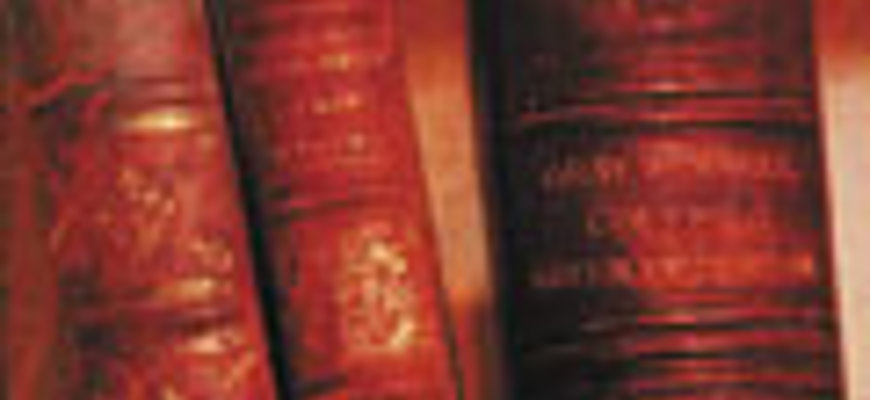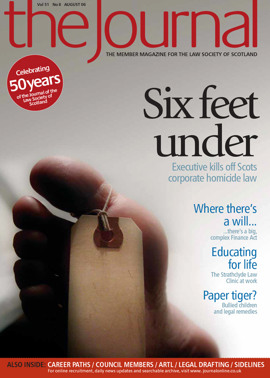Book reviews

Children’s Hearings in Scotland
Second edition
Kenneth McK Norrie
PUBLISHER: W GREEN
ISBN: 0 414 01587 8
PRICE: £45
It is hard to believe that the Children (Scotland) Act 1995 has been in force for almost a decade and that the whole concept of children’s hearings has been around for nearly four decades. The underlying ethos of the system is that it matters not whether a child has been referred for offending or due to concerns about his care and protection. What is important is that the child may be in need of compulsory measures of supervision and the children’s hearing’s paramount consideration will be his welfare throughout his childhood. Offending is often inextricably linked to care issues: if, for example, a child’s carers spend their money on drugs then it will not be surprising if he resorts to stealing food.
Professor Norrie is in a unique position to enlighten anyone interested in this subject, approaching it as he does from a professional viewpoint and also from a practical standpoint as a former children’s hearing panel member. As a result, there is a depth of feeling and understanding of the human issues involved as well as an explanation of the law in this textbook.
Those involved in this area of law, whether as lawyers, reporters, safeguarders, social workers or panel members, are aware that most hearings under the 1995 Act are in private, whether before a judge or in front of the three lay members who comprise a children’s hearing. Few persons have access to all aspects of the proceedings from beginning to end, so this book gives an overview of both forums.
I liked this book. It is a handy size. Indeed, I was surprised at just how much information it contained. It is clearly laid out; the succinct chapters follow a logical progression which makes it easy to refer to as required. The appendices are very useful, comprising a flowchart explaining child protection orders, part II of the 1995 Act, the 1996 Children’s Hearing Rules, the Act of Sederunt (Child Care and Maintenance Rules) 1997 and the Secure Accommodation (Scotland) Regulations 1996, all of which require to be referred to frequently both in court and at children’s hearings.
There has been a great deal of legislation since the first edition and reference is made in this new edition to the Antisocial Behaviour etc (Scotland) Act 2004, the Legal Representation (Scotland) Rules 2002, the Gender Recognition Act 2004 and the ECHR. The date of publication has missed the coming into force (in stages) of the Vulnerable Witnesses (Scotland) Act 2004, an important statute, which brings all children called as witnesses in these proceedings automatically within the terms of the Act.
Professor Norrie mentions that following the case of S v Miller in 2001 legislation was brought in allowing panels to appoint legal representation for children. However, my experience has been that legal representatives are not called upon as often as they might be and seem to be used mainly when the panel is considering making a supervision requirement with a condition that the child is placed and kept in secure accommodation. The Scottish Legal Aid Board states that there is no provision in the legislation for solicitors to be paid to represent clients (whether child or an adult) at the children’s hearing. As long as this situation prevails injustices will occur.
It will be interesting to see what changes the Scottish Parliament makes to the children’s hearing system following the consultation document “Getting it right for every child”. The Scottish Executive sometimes appears schizophrenic in its approach to children in that on one hand it appears to want to give children a greater voice in society by, for example, the appointment of a Children’s Commissioner, but on the other hand it disempowers them by an absence of provision for payment for legal representation at the children’s hearing where life changing decisions are made.
I would recommend that anyone interested in practising in this area of law ensures that they have a copy of this book. Professor Norrie will need to start on the third edition given the fast changing nature of this subject.
Eileen MJ Paterson
In this issue
- Ireland 4, Italy 0
- A lack of trust
- Technology and the Scottish courts
- For supplement read tax - an update
- Eyes on the ball
- Don't leave gaps in regulation
- Keeping company
- Fighting the bullies
- The university of life
- A lack of trust (1)
- With these few words...
- Tell it like it is
- All that sparkles ain't gold
- PDF is the standard
- The paper monster
- Safeguarding fair trial
- New law, new problems
- Raising the stakes
- Mark the pre-proof
- Scottish Solicitors Discipline Tribunal
- Website reviews
- Book reviews
- It takes two to tango
- Land attachment and suspensive missives
- PSG's suite moves






